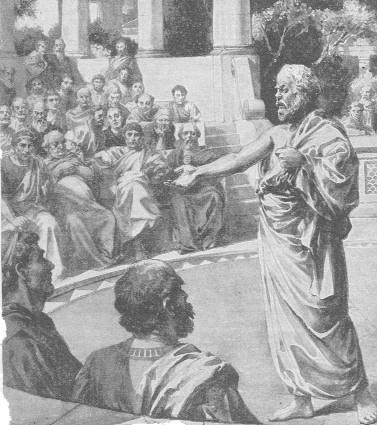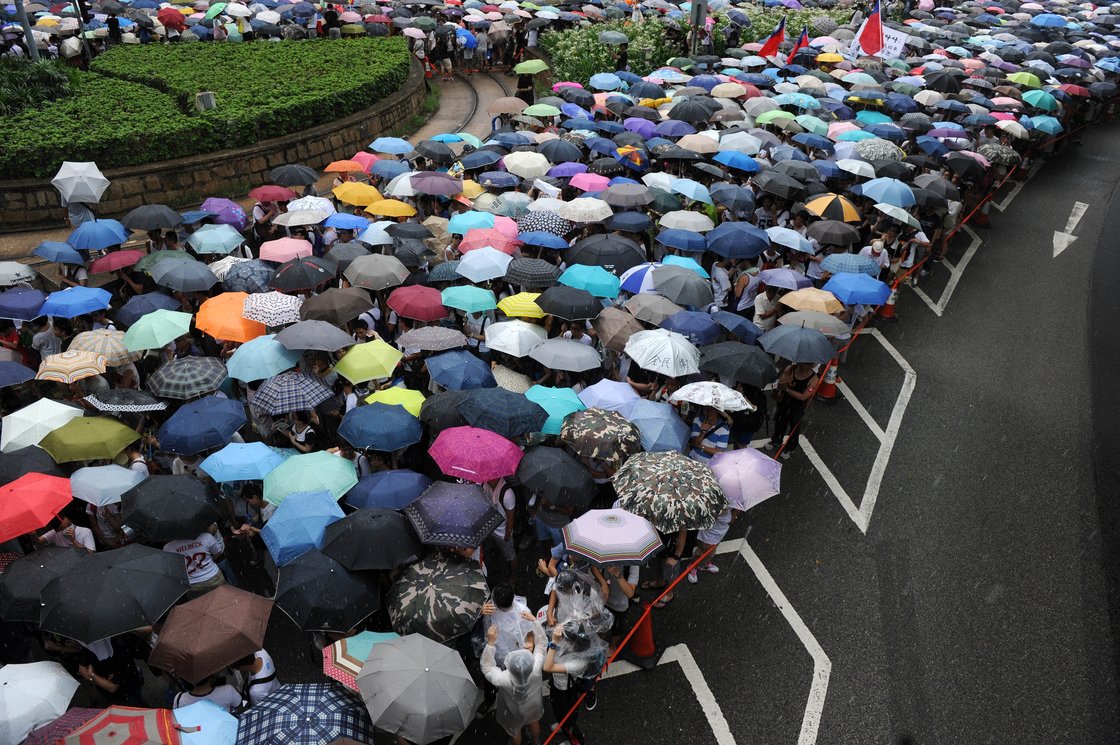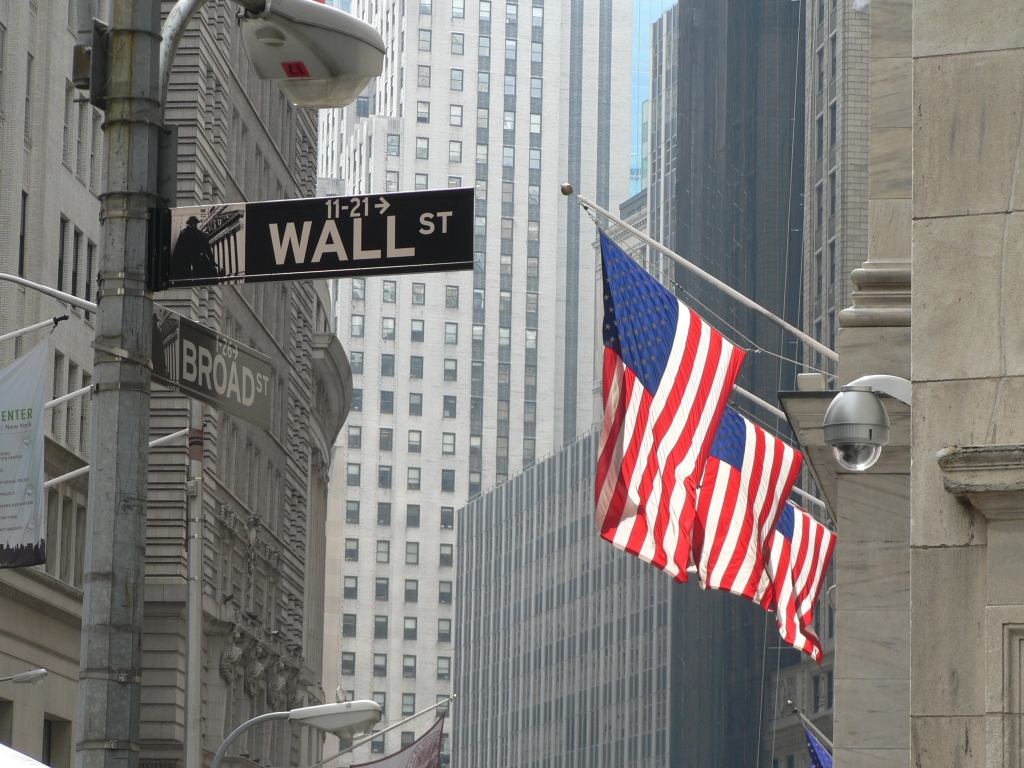-
The trial of Socrates (399 BC) occurred in the Heliaea, a popular tribunal, located at the bottom of Athens’s Agora. The heliastes (judges) mistook Socrates for a sophist (in a time when the sophists were commonly blamed for the defeat in the Peloponneses War and for the weakness of young citizens); the philosopher refused to defend his cause and accepted the sentence to death. Far from illustrating the judicial power, this event has remained an example of misguided democracy.

 your comment
your comment
-

The "Umbrella Revolution" in HongKong (September 2014)
The “umbrella revolution” took place in Hong-Kong streets in September 2014. It illustrates theattempt at citizen empowerment in a country where the individual is crushed by mass and aninvisible all-powerful party. Hence the umbrella, as a means of defence against photographers andcamera crews. your comment
your comment
-

Approaching NYSE (New York Stock Exchange)
The New York Stock Exchange in Wall Street is in no way a political form of power; indeed one of the smallest streets in NYC is home to the vital centre of financial decisions; traders, shareholders of multinationals work side by side with the government experts and contribute to the « fixing » of the world’s stocks and currencies.
 your comment
your comment
-
Both a dwelling and a world-famous sightseeing place, Buckingham Palace has remained, long after the British Empire disappeared, the symbol of monarchy. « The Queen doesn’t rule but reigns », meaning her power is all influential in character.

Buckingham Palace Guards (Photo : royalcollection.org.uk)
 your comment
your comment
-
- A short biography of Nelson Mandela -
Date of Birth: July 18, 1918 Place of Birth: Eastern Cape of South Africa
Parents: Father: - Gadla Henry Mphakanyiswa. Mother: Nosekeni Fanny.
1918 July 18: Rolihlahla Dalibhunga Mandela is born a member of the Madiba clan. His tribal name, "Rolihalah," means "troublemaker." He is later given his English name, Nelson, by a teacher at his school
1919 : His father is dispossessed of his land and money on the orders of a white magistrate. (1)
1927 His father dies. The acting chief of the Thembu clan, Jongintaba Dalindyebo becomes his guardian (2) and ensures he receives an excellent education
1937 Fort Hare University: Studied for a B.A. and met his lifelong friend Oliver Tambo
1939 Asked to leave Fort Hare due to his involvement in a boycott of the Students' Representative Council against the university policies
Moves to Johannesburg to escape an arranged marriage and experiences the system of apartheid which forbade the black population to vote, travel without permission or own land. Worked as a guard at a mine, then clerk at a law firm. Completed his degree via a correspondence course at the University of South Africa. Studies Law at the University of Witwatersrand whilst living in Alexandra
1943 Joins the African National Congress (ANC) as an activist.
1948 South African government (Afrikaner-dominated National Party) limits the freedom of black Africans even more when the apartheid policy of racial segregation is introduced across the country1952 Opens the first black legal firm in South Africa with fellow lawyer Oliver Tambo providing free or low-cost legal counsel to many blacks who would otherwise have been without legal representation.

(Nelson Mandela, or Madiba, his clanic name among the Xhosas people.)
1959 Parliament passes new laws extending racial segregation by creating separate homelands for major black groups in South Africa
1960 Sharpeville Massacre: Police kill 69 peaceful protestors and the ANC is banned
1964 June 12: Captured and convicted of sabotage and treason and sentenced to life imprisonment at the age of 46, initially on Robben island where he would be kept for 18 years
1968 His mother dies and his eldest son is killed in a car crash but he is not allowed to attend either of the funerals
1976 Over 600 students killed in protests at Soweto and Sharpeville
1986 Sanctions against South Africa tightened costing millions in revenue
1990 February 11: Nelson Mandela is released from prison after 27 years
President De Klerk lifts the ban on the African National Congress (ANC)
1993 March: Divorces Winnie Mandela
Nelson Mandela and Mr de Klerk are awarded the Nobel Peace Prize
1994 April 26: Free Elections where black South Africans are allowed to vote for the first time. Nelson Mandela runs for President. The ANC won 252 of the 400 seats in the national assembly
May: Inaugurated as the first black president of South Africa. He appoints de Klerk as deputy president and forms a racially mixed Government of National Unity.
1995 South Africa hosts the 1995 Rugby World Cup and South Africa wins. Nelson Mandela wears a Springbok shirt when he presents the trophy to Afrikaner captain Francois Pienaar. This gesture was seen as a major step in the reconciliation of white and black South Africans.
1999 Relinquishes presidency in favor of Thabo Mbeki, who was nominated ANC president in 1997.
Toured the world as a global statesman. 2004 : retires from public life a drawing by Ruben (Le Courrier International)
a drawing by Ruben (Le Courrier International) Notes:
- 1. The British Cape Colony, which included the "native reserve" of the Transkei, had been absorbed into the Union of South Africa in 1910, and three years later the Native Land Act dispossessed hundreds of thousands of black farmers, many of whom trekked to the Transkei, the only large area where Africans could own land. The Transkei has produced more black leaders than any other region of South Africa, and it was with this history that they were brought up.
Rolihlahla's father, Hendry Mandela, suffered his own dispossession. The year after his son was born the local white magistrate summoned Hendry to answer a tribesman's complaint about an ox. Hendry refused to come, and was promptly charged with insubordination and deposed from the chieftainship, losing most of his cattle, land and income. (Source : http://www.nytimes.com/books/first/s/sampson-mandela.html)
- (2) He was nine when his father died of a lung disease. According to Nelson's sister, Mabel, [his father] made a dying bequest to the Thembu regent, David Dalindyebo, giving Nelson into his care. "I can see from the way he speaks to his sisters and friends that his inclination is to help the nation," Mabel quoted her father as telling the regent.
The bequest took Nelson to the Thembu capital, Mqhekezweni, the "great place", where he became part of the royal family, being treated by Dalindyebo and his wife as their own child. "As a leader, I have always followed the principles I first saw demonstrated by the regent at the 'great place'," Mandela recalled. "I have always endeavoured to listen to what each and every person in a discussion had to say before venturing my own opinion. Often times, my own opinion will simply represent a consensus of what I heard in the discussion." (Source : http://www.theguardian.com/world/2013/dec/05/nelson-mandela-obituary) your comment
your comment




